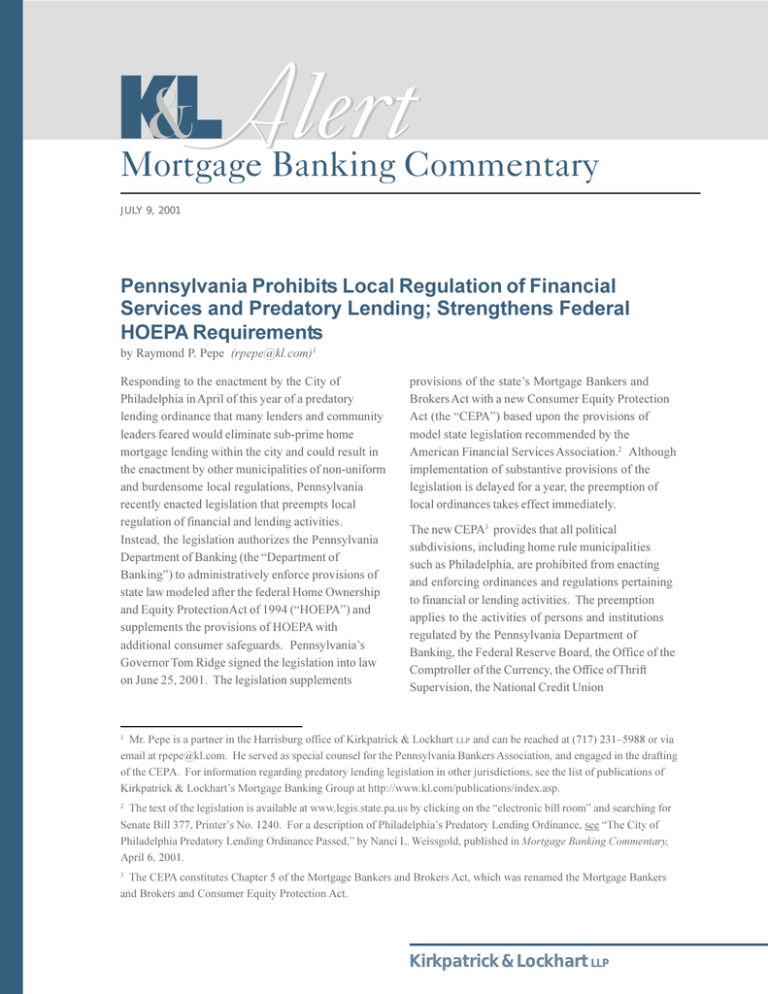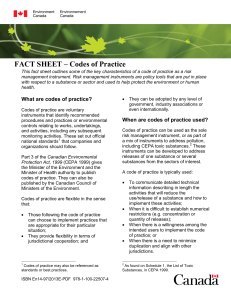
A lert
Mortgage Banking Commentary
JULY 9, 2001
Pennsylvania Prohibits Local Regulation of Financial
Services and Predatory Lending; Strengthens Federal
HOEPA Requirements
by Raymond P. Pepe (rpepe@kl.com)1
Responding to the enactment by the City of
Philadelphia in April of this year of a predatory
lending ordinance that many lenders and community
leaders feared would eliminate sub-prime home
mortgage lending within the city and could result in
the enactment by other municipalities of non-uniform
and burdensome local regulations, Pennsylvania
recently enacted legislation that preempts local
regulation of financial and lending activities.
Instead, the legislation authorizes the Pennsylvania
Department of Banking (the Department of
Banking) to administratively enforce provisions of
state law modeled after the federal Home Ownership
and Equity Protection Act of 1994 (HOEPA) and
supplements the provisions of HOEPA with
additional consumer safeguards. Pennsylvanias
Governor Tom Ridge signed the legislation into law
on June 25, 2001. The legislation supplements
provisions of the states Mortgage Bankers and
Brokers Act with a new Consumer Equity Protection
Act (the CEPA) based upon the provisions of
model state legislation recommended by the
American Financial Services Association.2 Although
implementation of substantive provisions of the
legislation is delayed for a year, the preemption of
local ordinances takes effect immediately.
The new CEPA3 provides that all political
subdivisions, including home rule municipalities
such as Philadelphia, are prohibited from enacting
and enforcing ordinances and regulations pertaining
to financial or lending activities. The preemption
applies to the activities of persons and institutions
regulated by the Pennsylvania Department of
Banking, the Federal Reserve Board, the Office of the
Comptroller of the Currency, the Office of Thrift
Supervision, the National Credit Union
Mr. Pepe is a partner in the Harrisburg office of Kirkpatrick & Lockhart LLP and can be reached at (717) 2315988 or via
email at rpepe@kl.com. He served as special counsel for the Pennsylvania Bankers Association, and engaged in the drafting
of the CEPA. For information regarding predatory lending legislation in other jurisdictions, see the list of publications of
Kirkpatrick & Lockharts Mortgage Banking Group at http://www.kl.com/publications/index.asp.
1
The text of the legislation is available at www.legis.state.pa.us by clicking on the electronic bill room and searching for
Senate Bill 377, Printers No. 1240. For a description of Philadelphias Predatory Lending Ordinance, see The City of
Philadelphia Predatory Lending Ordinance Passed, by Nanci L. Weissgold, published in Mortgage Banking Commentary,
April 6, 2001.
2
The CEPA constitutes Chapter 5 of the Mortgage Bankers and Brokers Act, which was renamed the Mortgage Bankers
and Brokers and Consumer Equity Protection Act.
3
Kirkpatrick & Lockhart LLP
Administration, the Federal Deposit Insurance
Corporation, the Federal Trade Commission and
Department of Housing and Urban Development.
Political subdivisions are also prohibited from
regulating persons and institutions that originate,
purchase, sell, assign, securitize and service financial
transactions or loans and may not disqualify persons
from doing business with local governments based
upon their financial activities or may not impose local
reporting requirements relating to financial or lending
activities.4
securitize or service loans.7 Enforcement of the
legislation by the Department of Banking and the
availability of civil damages are designated to be the
exclusive remedies for violations of the law, and
borrowers are not authorized to separately seek
statutory damages and other remedies for violations
of the CEPA under Pennsylvanias Unfair Trade
Practices Act. Borrowers may continue to pursue all
available remedies, however, for conduct that
otherwise violates requirements of the Unfair Trade
Practice Act itself.8
The new state legislation enacts state law
requirements of the HOEPA for mortgage loans with
an original principal balance of less than $100,000.5
By enacting the requirements of HOEPA as state law,
the Department of Banking is granted broad
authority to impose civil penalties for violations;
suspend, revoke or deny the issuance of licenses;
ban individuals from working for financial
institutions; issue cease and desist orders; order
restitution and initiate actions for injunctive relief.6
Borrowers adversely affected by violations of the
new law are also authorized to institute civil actions
to recover damages from lenders who purposefully
engage in any pattern or practice of material
violations, but are precluded from pursuing such
actions against persons who purchase, sell, assign,
In addition to enacting into state law the
requirements of HOEPA for covered loans, i.e.,
loans subject to HOEPA with an original principal
balance of $100,000 or less, the CEPA also expands
and strengthens the requirements of HOEPA.9 For
example, the new law:
4
n
n
Expands federal prohibitions upon balloon
payments for covered loans from five to ten
years.10
Prohibits the acceleration of covered loans
except for default, pursuant to due-on-sale
provisions, for fraud or material
misrepresentation or for activities that
adversely affect a lenders security or
enforcement rights.11
CEPA, § 504(a).
A covered loan is defined as a consumer credit mortgage loan transaction considered a mortgage for purposes of
HOEPA for which the original principal balance is less than $100,000. CEPA, § 503.
5
6
CEPA, § 521.
7
CEPA, § 522(a).
8
CEPA, § 522(b).
The law enacts provisions similar to HOEPA that prohibit negative amortization loans (except for borrowers with gross
income in excess of 150% of the area median family income); prohibit interest rate increases upon default; prohibit loan
terms that require advance payments, and limit prepayment fees; and restrict the use of loan proceeds to pay home
improvement contractors. Compare CEPA, § 511(c) with 15 U.S.C. § 1639(f) (relating to negative amortization); CEPA,
§ 511(d) with 15 U.S.C. § 1639(d) (relating to increases in interest rate upon default); CEPA, § 511(e) with 15 U.S.C.
§ 1639(g) (relating to advance payments); CEPA § 511(f) with 15 U.S.C. § 1639(c) (relating to prepayment fees); and
CEPA, § 512(e) with 15 U.S.C. § 1639(i) (relating to home improvement contracts).
9
2
10
Compare CEPA, § 511(a) with 15 U.S.C. § 1639(e).
11
CEPA, § 511(b).
Kirkpatrick & Lockhart LLP
n
n
n
n
n
3
Requires additional disclosures for covered
loans advising borrowers to shop around
and compare loan rates and fees; regarding
access to credit counseling through the
Pennsylvania Housing Finance Agency;
about the availability of escrow services for
tax and insurance payments; and warning
borrowers consolidating loans not to ignore
payments to existing creditors.12
Prohibits the charging of points for
refinancing covered loans with new covered
loans within one year of origination, except for
refinancing that provides additional proceeds
to borrowers.13
Requires a prior lenders consent for the
refinancing of covered loans of zero or low
interest loans made by government or
nonprofit lenders.14
Prohibits the sale of single premium credit
insurance as part of a covered loan
transaction unless the lender offers the
borrower the option to purchase the policy on
a monthly premium basis; advises the
borrower that insurance is not required as a
condition of closing; and advises the
borrower that the policy may be cancelled
within 30 days for a full refund.15
Requires reporting of both favorable and
unfavorable payment history information to
consumer credit reporting agencies for
covered loans, except pursuant to agreements
relating to disputes or for loans held for less
than 90 days.16
n
Mandates that lenders verify the license
status of all mortgage brokers utilized in
originating covered loans.17
The new legislation also contains several provisions
intended to promote and simplify compliance with
HOEPA requirements. For example, lenders are
deemed to not violate prohibitions upon lending
without respect to a borrowers ability to repay if the
income of a borrower is more than 120% of the
median family income of the area or if loans
repayments do not exceed 50% of gross monthly
income. In enforcing the new law, the Department of
Banking is also required to do so to the fullest
extent practical in a manner consistent with federal
laws and regulations.18 To the extent any
provisions of the state law are preempted by federal
law with respect to national banks or federal savings
associations, the law provides that such provisions
of the law will also not apply to the activities of
operating subsidiaries of national banks or federal
savings associations.19 Finally, provisions of the
new law are not deemed to override the parity
provisions of the Banking Code that allow state
chartered financial institutions and their subsidiaries
to exercise the same powers as national banks,
federal savings associations and their subsidiaries,
or financial institutions exercising other power
approved by the FDIC, subject only to conditions,
limitations or restrictions otherwise imposed upon
national banks, federal savings associations or their
subsidiaries or as necessary to protect safety and
soundness.20
12
Compare CEPA, § 512(a) with 15 U.S.C. § 1639(a).
13
CEPA, § 512(c).
14
CEPA, § 512(d).
15
CEPA, § 512(f).
16
CEPA, § 513(a).
17
CEPA, § 513(b).
18
CEPA, §§ 503 (definitions of gross income and median family income) & 512(b).
19
CEPA, § 504(c).
20
CEPA, § 504(b).
Kirkpatrick & Lockhart LLP
The provisions of the CEPA generally do not take
effect for one year in order to allow adequate time for
financial institutions to develop plans for regulatory
compliance.21 Requirements relating to the offering
of alternatives to single premium credit insurance
products are delayed for 18 months, plus an
additional six months if necessary to obtain
regulatory approval of additional insurance
products.22 Provisions of the law preempting local
regulation, however, take effect immediately and are
deemed to restate and confirm the existing law of
Pennsylvania, namely that the laws of [the]
Commonwealth relating to financial and lending
activities are to be applied on a uniform statewide
basis.23
21
Act 55 of 2001, § 11(2).
22
CEPA, § 512(f).
23
Act 55 of 2001, § 10.
Pending implementation of the new state law, a court
of common pleas in Philadelphia in the matter of
American Financial Services Association v. City of
Philadelphia and Association of Community
Organizations for Reform Now (ACORN) has
extended a preliminary injunction against
implementation of Philadelphias predatory lending
ordinance until at least August 31, 2001.
© 2001 Kirkpatrick & Lockhart
LLP 24
Kirkpatrick & Lockhart LLP grants the right to reproduce and disseminate this article, without compensation, to any
person who wishes to do so for non-commercial purposes, so long as the full title, identification of Kirkpatrick &
Lockhart LLP as that source, date of issuance and copyright information are included in all copies and changes are not made
to the text of the article. This license extends to reproduction in both print and electronic form. This article is provided
for informational purposes and does not contain or convey legal advice. The information herein should not be
used or relied upon in regard to any particular facts or circumstances without first consulting with a lawyer.
24
4
Kirkpatrick & Lockhart LLP
MORTGAGE BANKING/CONSUMER FINANCE GROUP
Kirkpatrick & Lockhart LLP was founded in 1946, and, with more than 600 lawyers, is one of the thirty-five
largest law firms in the United States. K&L attorneys are based in ten offices in key US cities Boston,
Dallas, Harrisburg, Los Angeles, Miami, Newark, New York, Pittsburgh, San Francisco, and Washington. Our
firm represents a broad range of clients in a wide variety of matters, including corporate and securities,
e-commerce, investment management, insurance coverage, financial institutions, mortgage banking and
consumer finance, creditors rights, intellectual property, tax, labor, environmental, antitrust, health care, and
government contracts. More than half our attorneys are litigators. We litigate class actions on a range of
financial issues, generally defending financial institutions, broker-dealers, public companies, and investment
companies and their officers and directors against claims of violations of securities laws, consumer credit laws,
and common law tort and contract claims. You can learn more about our firm by visiting our Internet website
at www.kl.com.
The Mortgage Banking/Consumer Finance Group provides legal advice and licensing services to the
consumer lending industry. We counsel clients engaged in the full range of mortgage banking activities,
including the origination, processing, underwriting, closing, funding, insuring, selling, and servicing of
residential mortgage loans and consumer loans, from both a transactional and regulatory compliance
perspective. Our focus includes both first- and subordinate-lien residential mortgage loans, as well as openend home equity, property improvement loans and other forms of consumer loans. We also have experience in
multi-family and commercial mortgage loans. Our clients include mortgage companies, depository institutions,
consumer finance companies, investment bankers, insurance companies, real estate agencies, homebuilders,
and venture capital funds. Members of the Mortgage Banking/Consumer Finance Group and their telephone
numbers and e-mail addresses are listed below:
ATTORNEYS
Laurence E. Platt
Phillip L. Schulman
Thomas J. Noto
Costas A. Avrakotos
Melanie L. Hibbs
Irene C. Freidel
Jonathan Jaffe
R. Bruce Allensworth
Daniel J. Tobin
Anthony P. La Rocco
Eric J. Edwardson
Emily J. Booth
Suzanne F. Garwood
Steven M. Kaplan
Kristie D. Kully
Carol M. Tomaszczuk
Nanci L. Weissgold
5
(202) 7789034
(202) 7789027
(202) 7789114
(202) 7789075
(202) 7789203
(617) 2613115
(415) 2491023
(617) 2613119
(202) 7789074
(973) 8484014
(202) 7789387
(202) 7789112
(202) 7789892
(202) 7789204
(202) 7789301
(202) 7789206
(202) 7789314
lplatt@kl.com
pschulman@kl.com
tnoto@kl.com
cavrakotos@kl.com
mhibbs@kl.com
ifreidel@kl.com
jjaffe@kl.com
ballensworth@kl.com
dtobin@kl.com
alarocco@kl.com
eedwardson@kl.com
ebooth@kl.com
sgarwood@kl.com
skaplan@kl.com
kkully@kl.com
ctomaszczuk@kl.com
nweissgold@kl.com
Kirkpatrick & Lockhart LLP
DIRECTOR OF LICENSING
Stacey L. Riggin
(202) 7789202
sriggin@kl.com
REGULATORY COMPLIANCE ANALYSTS
Dana L. Lopez
(202) 7789383
Nancy J. Butler
(202) 7789374
Susan C. Grassmann
(202) 7789129
Joelle Myers
(202) 7789093
Marguerite T. Frampton
(202) 7789253
Jeffrey Prost
(202) 7789364
Tiffany C. Hornsby
(202) 7789451
dlopez@kl.com
nbutler@kl.com
sgrassmann@kl.com
jmyers@kl.com
mframpton@kl.com
jprost@kl.com
thornsby@kl.com
LAW CLERKS
Tara L. Goebel
(202) 7789261
tgoebel@kl.com
LEGAL ASSISTANTS
Mera C. Choi
Elizabeth J. Gullotta
(202) 7789415
(202) 7789044
mchoi@kl.com
egullotta@kl.com
BOSTON n DALLAS n HARRISBURG n LOS ANGELES n MIAMI n NEWARK n NEW YORK n PITTSBURGH n SAN FRANCISCO n WASHINGTON
.........................................................................................................................................................................
This publication/newsletter is for informational purposes and does not contain or convey legal advice. The information herein
should not be used or relied upon in regard to any particular facts or circumstances without first consulting with a lawyer.
© 2001 KIRKPATRICK & LOCKHART LLP.
ALL RIGHTS RESERVED.




